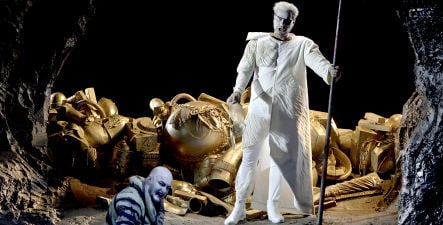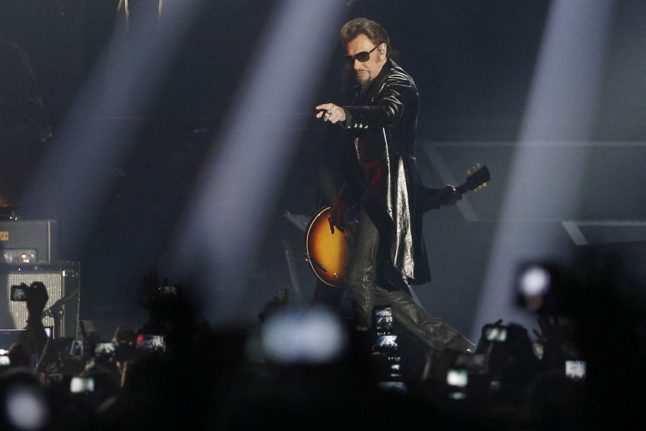The hard wooden seats of Bayreuth’s Festspielhaus have only the thinnest possible cushioning for a reason – too much padding would ruin the hallowed hall’s legendary acoustic.
That’s a scientific fact, but the seats also have another more subjective use, namely as a barometer of the evening’s performance.
If, after five hours and more, you still don’t notice how hard the seat you’re sitting on is, it’s a fairly good indication you’re enjoying yourself. If, on the other hand, you start fidgeting after just half an hour, you can bet your bottom dollar that you’re not and that you’re in for a long and uncomfortable night.
“Rhinegold,” the first installment of Tankred Dorst’s production of Richard Wagner’s sprawling four-opera “Ring” that reopened here on Monday night, scores pretty low on the seat-barometer.
At a mere two and a half hours, “Rhinegold” is the composer’s shortest-ever opera, but the evening drags interminably and rarely have the Festspielhausseats felt so uncomfortable. The problem is Dorst’s willful refusal to interpret it or any other part of the 16-hour tetralogy, arguably Wagner’s masterpiece.
The opening picture – the Rhinemaidens as underwater glow-worms among the rocks and boulders on the river bed while the water surface shimmers above – is a visual treat. But the “Ring” is more than just a series of pretty pictures. And a director needs plenty of ideas and proven stagecraft to make sense of Wagner’s complex symbology and render his bombastic and convoluted reinterpretation of ancient Norse mythology digestible for modern audiences.
This particular “Ring” is now entering its third consecutive year at the Bayreuth Festival, the legendary summer music fest dedicated exclusively to Wagner’s works. But Dorst has not changed his staging one iota since it was first premiered – and critically panned – in 2006.
His one and only idea is that the world of Wagner’s mega-opera, with all its gods, demi-gods, dwarves and giants, co-exists with our own while remaining invisible to our eyes.
Thus, while the evil dwarf Alberich steals the Rhinegold from the Rhinemaidens in the first scene, naked swimmers dive and frolic in the waters above. Similarly, while the chief god Wotan haggles over the price of building Valhalla with the giants Fasolt and Fafner in the second scene, a tourist wanders by, obliviously taking snapshots.
It’s a simple but striking idea, but Dorst does not develop it further and leaves the characters high and dry with no direction. Wotan and the others move aimlessly around the stage, with no discernible reason or intent.
During the first year, there may have been an excuse for such sketchy direction: Dorst was brought in at the last minute after Danish film-maker Lars von Trier pulled out unexpectedly from the project. However, two years on and Dorst’s downright refusal to add or change anything verges on the petulant.
Musically, this “Rhinegold”, conducted by German maestro Christian Thielemann, was solid but unexceptional, as if the singers, too, had given up over Dorst’s indifference.
German bass-baritone Albert Dohmen was an unremarkable Wotan, small-voiced and lacking depth and sonority. South African mezzo Michelle Breedt and Italian-born soprano Edith Haller failed to make any lasting impression as Fricka and Freia.
Only Dutch tenor Arnold Bezuyen as the fire demi-god and the two Nibelungs – British baritone Andrew Shore as Alberich and German tenor Gerhard Siegel as Mime – came anywhere near up to scratch.
Conductor Thielemann, whose masterful reading of the score had made the Bayreuth “Ring” such a joy to listen to last year, lacked real inspiration this time round, only really coming alive in the orchestral interludes.
Dorst’s “Ring” is set to continue on Tuesday with a performance of the second part, “The Valkyrie.” And with a running time of more than five hours, Bayreuth’s unofficial seat-barometer suggests audiences should bring plenty of cushions to make the evening slightly more bearable.



 Please whitelist us to continue reading.
Please whitelist us to continue reading.